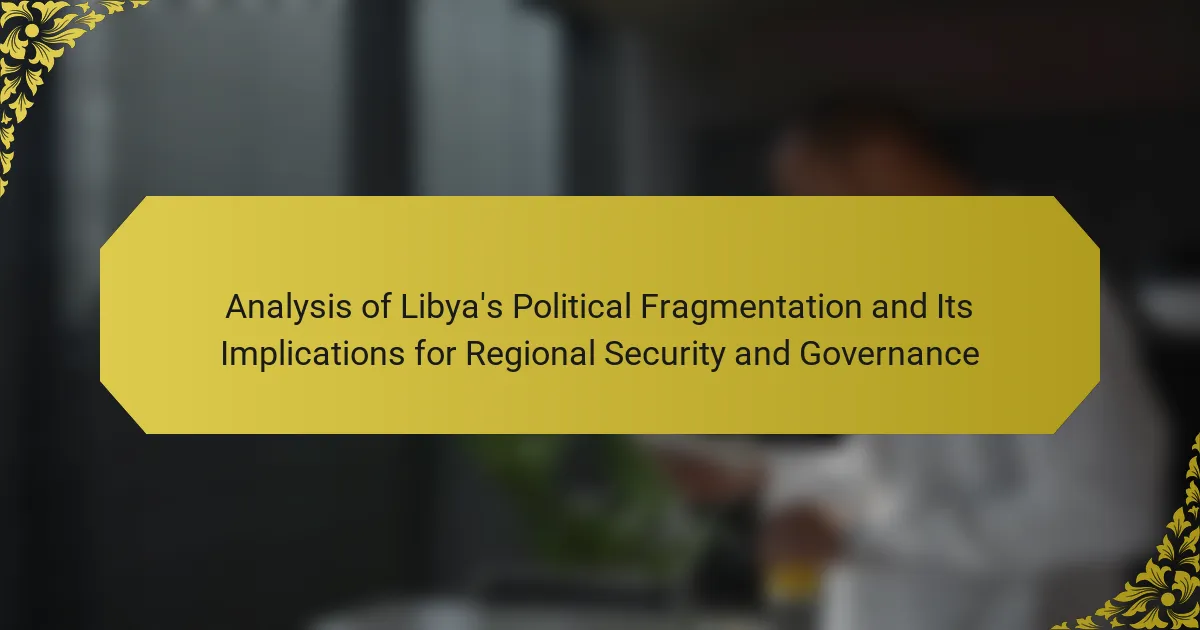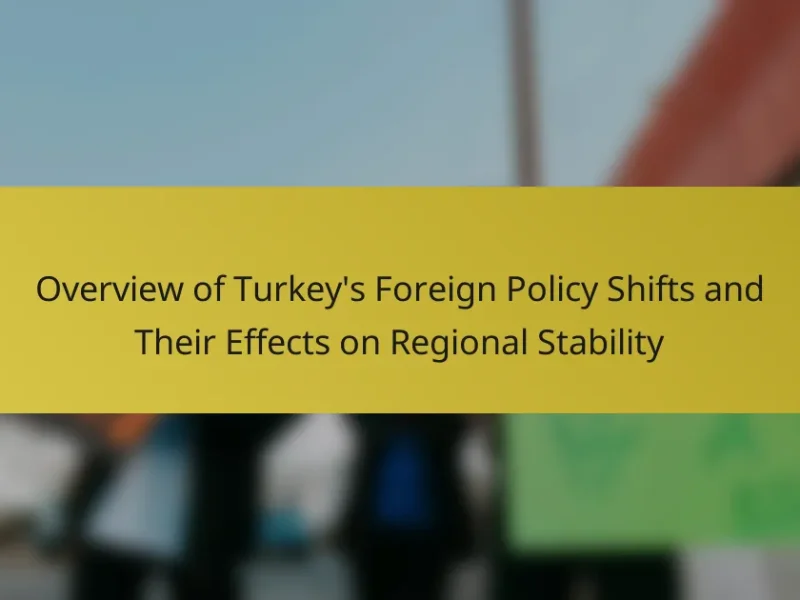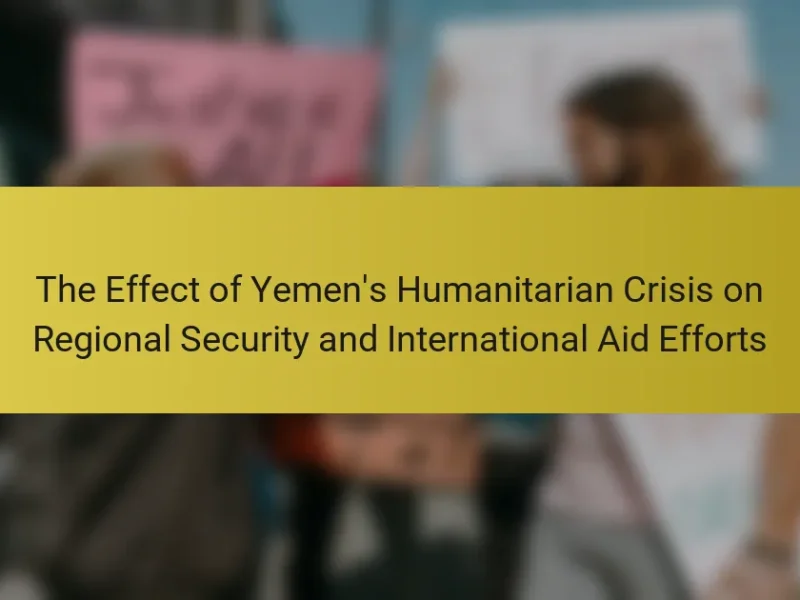
What are the key factors contributing to Libya’s political fragmentation?
Libya’s political fragmentation is primarily driven by the lack of a unified government. Following the fall of Muammar Gaddafi in 2011, multiple factions emerged. These factions include militias, tribal groups, and political parties. The absence of a central authority has led to power struggles. Regional rivalries further complicate the situation. Foreign interventions have also played a significant role. Countries like Turkey and Russia support different factions. Economic instability exacerbates the fragmentation. Oil revenues are often controlled by competing groups. This creates a cycle of conflict and division.
How has Libya’s historical context influenced its current political landscape?
Libya’s historical context significantly shapes its current political landscape. The legacy of colonialism, particularly Italian rule from 1911 to 1943, created deep-seated divisions. Post-independence in 1951, the monarchy struggled to unify the diverse tribal and regional factions. Muammar Gaddafi’s regime, which lasted from 1969 to 2011, further entrenched these divisions through authoritarian governance and patronage networks. The 2011 uprising against Gaddafi led to a power vacuum, exacerbating fragmentation among various armed groups. Current political instability stems from the lack of a strong central government and ongoing conflicts among rival factions. The historical patterns of tribal loyalty and regionalism continue to influence alliances and conflicts today.
What role did the 2011 revolution play in shaping Libya’s political divisions?
The 2011 revolution significantly intensified Libya’s political divisions. It led to the overthrow of Muammar Gaddafi but created a power vacuum. Various factions emerged, each vying for control. The lack of a unifying political framework exacerbated existing regional and tribal rivalries. Militias gained influence, complicating governance and stability. The proliferation of armed groups fragmented authority further. International interventions also fueled divisions by supporting different factions. Overall, the revolution catalyzed a complex landscape of political fragmentation in Libya.
How have external interventions affected Libya’s internal politics?
External interventions have significantly influenced Libya’s internal politics. Various foreign powers have supported different factions, exacerbating political fragmentation. For instance, the 2011 NATO intervention led to the ousting of Muammar Gaddafi. This intervention created a power vacuum, resulting in competing militias and governments. Additionally, countries like Egypt and the UAE have backed Khalifa Haftar, while Turkey has supported the Government of National Accord. These external influences have hindered the establishment of a unified government. The ongoing conflicts fueled by external support have destabilized the region further. As of 2023, Libya remains divided, with no clear resolution in sight.
What are the main political factions involved in Libya’s fragmentation?
The main political factions involved in Libya’s fragmentation are the Government of National Unity (GNU), the Libyan National Army (LNA), and various regional and tribal groups. The GNU, recognized by the United Nations, is based in Tripoli and led by Prime Minister Abdul Hamid Dbeibeh. The LNA, commanded by Khalifa Haftar, controls significant territory in eastern Libya and seeks to establish a military-led government. Additionally, various militias and tribal factions operate independently, often complicating the political landscape. These factions contribute to ongoing instability and conflict within the country.
Who are the key players in Libya’s political arena?
The key players in Libya’s political arena include the Government of National Unity (GNU), the Libyan National Army (LNA), and various political factions. The GNU is led by Prime Minister Abdul Hamid Dbeibeh. The LNA is commanded by General Khalifa Haftar. Various political factions include the House of Representatives and the High Council of State. These entities have significant influence over Libya’s governance and security landscape. Their interactions shape the ongoing political fragmentation in the country. The GNU and LNA are often in conflict, impacting regional stability. Political negotiations frequently involve international stakeholders, reflecting the complexity of Libya’s political situation.
What ideologies drive the different factions in Libya?
Libya’s factions are driven by various ideologies including nationalism, Islamism, and tribalism. Nationalist factions seek a unified Libyan state and often emphasize national sovereignty. Islamists aim to implement Sharia law and promote Islamic governance. Tribal factions prioritize local allegiances and traditional authority structures. These ideological divides lead to conflicts over governance, resources, and power. For instance, the Government of National Unity aligns with moderate Islamism, while the Libyan National Army emphasizes nationalism and military strength. The presence of these ideologies complicates the political landscape and hinders efforts for reconciliation and stability in Libya.
What are the implications of political fragmentation for governance in Libya?
Political fragmentation significantly undermines governance in Libya. It leads to a lack of unified authority, resulting in competing factions. These factions often operate independently, complicating decision-making processes. The absence of a central government hinders effective policy implementation. Resources are frequently misallocated due to factional interests. This fragmentation creates an environment of instability and insecurity. For instance, various armed groups vie for control, exacerbating violence. Furthermore, political fragmentation obstructs international relations and foreign aid efforts. Overall, it perpetuates a cycle of conflict and governance failure in Libya.
How does fragmentation impact the effectiveness of governance structures?
Fragmentation significantly undermines the effectiveness of governance structures. It creates competing authorities and weakens centralized decision-making. This leads to inconsistent policy implementation across regions. Fragmentation can also foster instability and conflict among different factions. In Libya, various militias and political groups vie for power, complicating governance. As a result, public services become fragmented and less accessible. This situation hinders economic development and exacerbates humanitarian crises. Studies show that fragmented governance correlates with lower levels of public trust and engagement.
What challenges do fragmented governance structures pose for public services?
Fragmented governance structures pose significant challenges for public services. These challenges include inefficiency in service delivery. Multiple authorities may lead to overlapping responsibilities. This can create confusion and delays in accessing services. Additionally, coordination among various entities becomes complex. Different priorities among governing bodies can result in inconsistent service quality. Resource allocation may also suffer due to fragmented decision-making. A lack of unified strategy can hinder effective policy implementation. Overall, fragmentation undermines the effectiveness of public services.
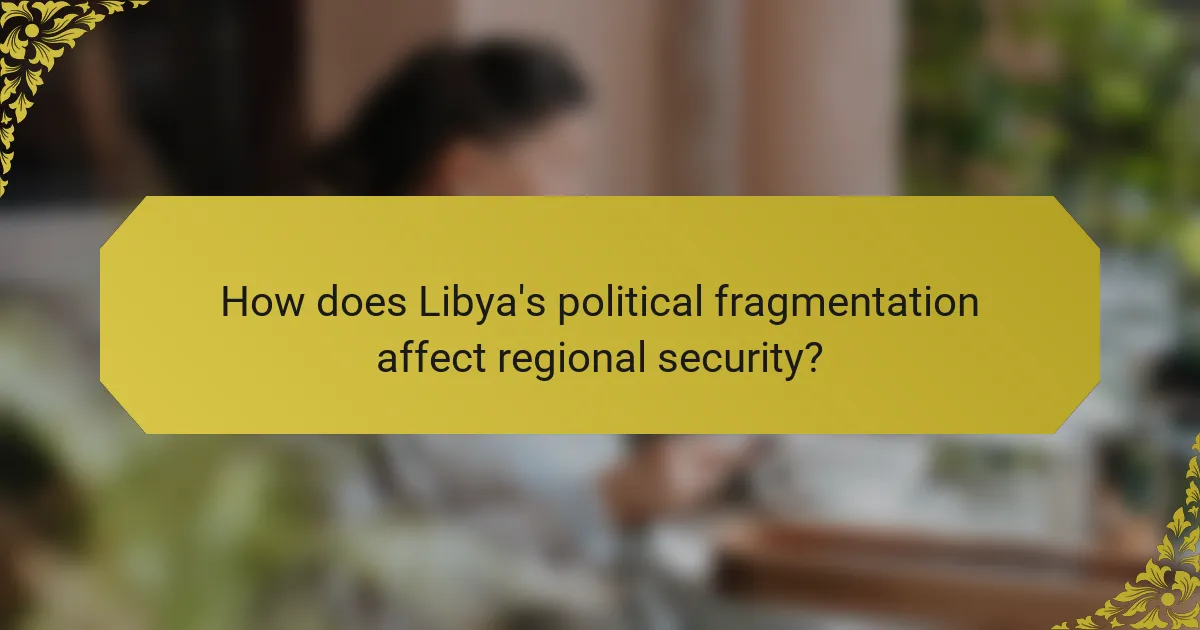
How does Libya’s political fragmentation affect regional security?
Libya’s political fragmentation significantly undermines regional security. The division among rival factions leads to instability and violence. This fragmentation creates a power vacuum that extremist groups exploit. For instance, ISIS has attempted to gain a foothold in Libya amid the chaos. Furthermore, the ongoing conflict hampers effective governance and law enforcement. Neighboring countries face increased risks of spillover violence and refugee flows. The lack of a unified government complicates international diplomatic efforts. Consequently, Libya’s fragmentation poses a threat not only to its own stability but also to the broader North African region.
What security threats arise from Libya’s fragmented political situation?
Libya’s fragmented political situation leads to multiple security threats. These include the rise of armed militias that operate independently of the state. The lack of a unified government creates power vacuums. This instability attracts extremist groups seeking to exploit the chaos. Furthermore, the proliferation of weapons exacerbates violence and lawlessness. Human trafficking and smuggling networks thrive in this environment. The ongoing conflict undermines regional stability and affects neighboring countries. According to the United Nations, this fragmentation has resulted in a humanitarian crisis, worsening the security landscape.
How does political instability in Libya contribute to the rise of extremist groups?
Political instability in Libya significantly contributes to the rise of extremist groups. The collapse of central authority has created a power vacuum. This vacuum allows various factions to emerge and operate unchecked. As a result, extremist groups exploit the chaos to gain influence and recruit members. The lack of effective governance facilitates the spread of radical ideologies. Furthermore, ongoing conflicts distract security forces from countering extremism. Historical data shows that countries with political instability often see a surge in extremist activities. In Libya, the absence of a unified government has led to increased violence and lawlessness.
What are the risks of spillover effects on neighboring countries?
Spillover effects from Libya’s political fragmentation pose significant risks to neighboring countries. These risks include increased instability and violence as armed groups may cross borders. Neighboring nations could experience an influx of refugees fleeing conflict, straining resources and social services. Economic disruption may occur due to disrupted trade routes and regional markets. Furthermore, the spread of extremist ideologies could destabilize governments in the region. Historical examples, such as the fallout from the Libyan Civil War in 2011, illustrate these risks. Countries like Tunisia and Egypt faced security challenges and economic impacts as a direct consequence of Libya’s instability.
How have regional actors responded to Libya’s political fragmentation?
Regional actors have responded to Libya’s political fragmentation by engaging in diplomatic initiatives and military interventions. Countries like Egypt and the United Arab Emirates have supported the Libyan National Army led by Khalifa Haftar. Conversely, Turkey has backed the Government of National Accord in Tripoli. These actions reflect regional power dynamics and interests in Libya’s resources. Additionally, regional organizations like the African Union have attempted to mediate peace talks. The involvement of these actors has further complicated the conflict, leading to a protracted stalemate. This fragmentation has implications for regional security, as it allows for the proliferation of armed groups and instability.
What strategies are neighboring countries employing to address security concerns?
Neighboring countries are employing various strategies to address security concerns stemming from Libya’s political fragmentation. These strategies include enhanced border security measures to prevent the spillover of violence. Regional cooperation through intelligence sharing is also being prioritized to improve situational awareness. Diplomatic engagement with Libyan factions aims to foster dialogue and reduce tensions. Economic assistance programs are being implemented to stabilize the region and address root causes of insecurity. Additionally, military collaboration among neighboring countries seeks to counter threats from armed groups. These approaches reflect a comprehensive effort to mitigate the impact of Libya’s instability on regional security.
How do regional alliances influence Libya’s political dynamics?
Regional alliances significantly influence Libya’s political dynamics by shaping power relations among local factions. These alliances often provide military, financial, and diplomatic support to rival groups. For instance, countries like Turkey and Qatar have backed the Government of National Accord (GNA), while Egypt and the UAE have supported the Libyan National Army (LNA). This external involvement escalates conflicts and complicates peace efforts. The alignment of regional powers with specific factions often leads to a fragmentation of authority within Libya. Consequently, Libya’s governance remains unstable as competing interests hinder cohesive national policies. The ongoing geopolitical rivalries in the region further exacerbate these dynamics, making resolution increasingly difficult.
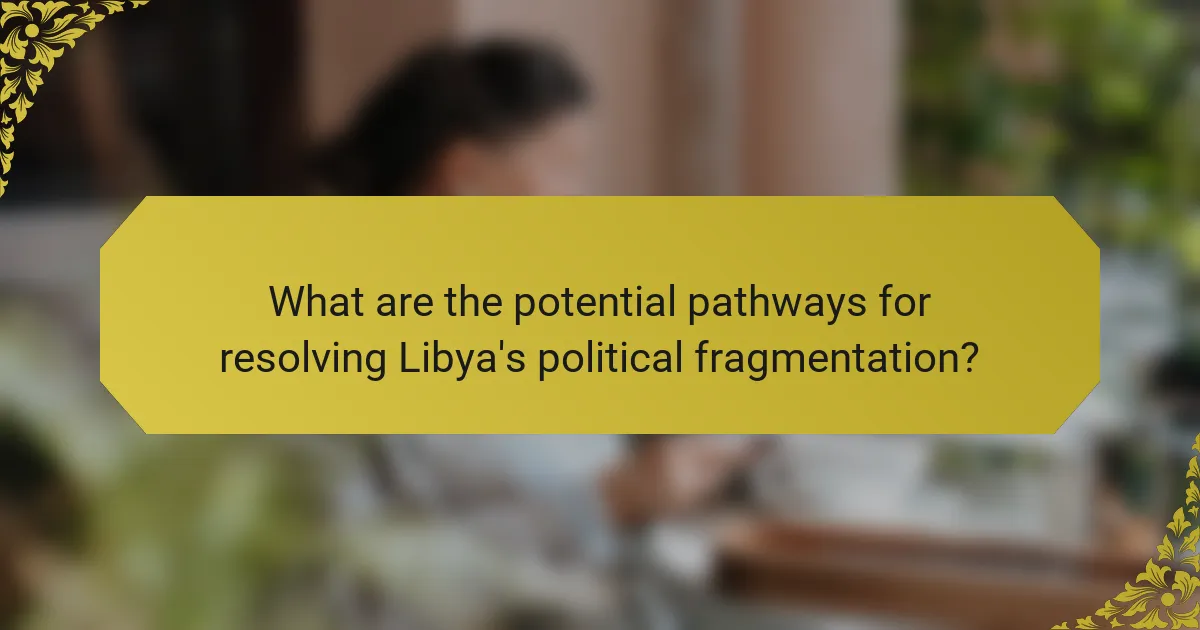
What are the potential pathways for resolving Libya’s political fragmentation?
The potential pathways for resolving Libya’s political fragmentation include dialogue, inclusive governance, and international mediation. Dialogue among Libyan factions can foster understanding and compromise. Establishing inclusive governance can address the needs of diverse groups within Libya. International mediation can provide neutral support and facilitate negotiations. Historical examples show that such approaches can lead to successful conflict resolution. The 2015 Libyan Political Agreement aimed to unify rival governments but faced challenges. Continued efforts are essential for a sustainable political solution in Libya.
What diplomatic efforts are being made to unify Libya’s political factions?
The diplomatic efforts to unify Libya’s political factions include the United Nations-led political dialogue. This dialogue aims to establish a unified government and address the ongoing conflict. Various Libyan stakeholders have participated in these discussions. The UN has facilitated meetings to promote consensus among rival factions. Additionally, regional actors, such as Egypt and Algeria, are involved in mediation efforts. They seek to support a peaceful resolution and stability in Libya. The Libyan Political Dialogue Forum was a significant initiative launched in 2020. It aimed to create a roadmap for elections and governance reforms. These efforts reflect a broader international commitment to restore peace in Libya.
How effective are current peace negotiations in addressing the root causes of fragmentation?
Current peace negotiations in Libya are moderately effective in addressing the root causes of fragmentation. They have facilitated dialogue among various factions. However, key issues such as economic disparity and tribal divisions remain unresolved. The Libyan Political Dialogue Forum has made progress, yet implementation of agreements is inconsistent. According to the United Nations, only 30% of the agreed measures have been enacted. This lack of follow-through undermines long-term stability. Moreover, external influences complicate the negotiation process. Regional powers often support rival factions, hindering unity. Therefore, while negotiations show promise, significant challenges persist in addressing fragmentation comprehensively.
What role does the international community play in Libya’s political resolution?
The international community plays a crucial role in Libya’s political resolution by facilitating dialogue among conflicting parties. It provides diplomatic support and mediates negotiations to achieve consensus. Organizations like the United Nations have led efforts to unify the political landscape. The international community also imposes sanctions to deter violence and encourage compliance with peace agreements. Financial aid and humanitarian assistance are provided to stabilize the country. Additionally, it monitors the security situation to prevent the resurgence of conflict. These actions aim to foster a sustainable political environment in Libya.
What lessons can be learned from other countries that have faced similar fragmentation?
Countries that have faced similar fragmentation offer several lessons. For instance, the importance of inclusive governance is evident in Iraq’s experience. Post-2003, Iraq faced significant fragmentation but learned that engaging various ethnic and sectarian groups in governance can foster stability. Additionally, South Sudan’s struggle highlights the need for strong institutions. Weak institutional frameworks contributed to its fragmentation, suggesting that building robust governance structures is crucial. Moreover, the case of Bosnia and Herzegovina illustrates the value of international mediation. External actors played a key role in resolving conflicts and promoting peace. Lastly, the necessity of addressing socio-economic disparities is underscored by the experiences of Somalia. Economic grievances often fuel fragmentation, indicating that equitable resource distribution is vital for unity. These examples collectively emphasize the need for inclusive governance, strong institutions, international cooperation, and socio-economic equity to mitigate fragmentation.
How have successful reconciliations been achieved in comparable contexts?
Successful reconciliations in comparable contexts have been achieved through inclusive dialogue and power-sharing agreements. In countries like South Africa, the Truth and Reconciliation Commission facilitated healing by addressing past injustices. Similarly, in Colombia, peace negotiations with FARC included provisions for political participation and land reform. These approaches emphasize the importance of stakeholder involvement in the reconciliation process. Evidence shows that inclusive frameworks lead to more sustainable peace outcomes. For instance, the United Nations supports inclusive dialogue as a best practice in conflict resolution.
What best practices can be applied to Libya’s situation?
Promoting inclusive dialogue among Libyan factions is essential. This approach fosters understanding and cooperation. Establishing a national reconciliation framework can help bridge divides. Supporting local governance initiatives strengthens community resilience. Encouraging economic development can reduce dependency on external actors. Enhancing security sector reforms is vital for stability. Engaging international partners for diplomatic support can provide necessary resources. These practices are crucial for addressing Libya’s complex political landscape.
What practical steps can Libyan leaders take to foster unity and stability?
Libyan leaders can foster unity and stability by promoting inclusive dialogue among all political factions. This approach can help address grievances and build consensus. Establishing a national reconciliation process is essential to heal divisions from past conflicts. Implementing security sector reforms will enhance the capacity of local forces to maintain peace. Strengthening institutions that promote rule of law is critical for governance. Encouraging economic development initiatives can reduce dependency on external actors. Facilitating grassroots participation in decision-making empowers communities and fosters trust. Lastly, engaging international partners for support can provide necessary resources and expertise. These steps are vital for creating a cohesive and stable Libya.
The main entity of this article is Libya’s political fragmentation. The article analyzes the key factors contributing to this fragmentation, including the lack of a unified government, historical context, and external interventions. It highlights the implications of political fragmentation for governance and regional security, discussing how competing factions and ideologies exacerbate instability. Additionally, the article explores potential pathways for resolving these issues, emphasizing the importance of dialogue, inclusive governance, and international mediation. The impact of fragmentation on public services and the challenges faced by neighboring countries are also examined.
